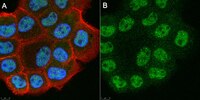04-642-I-100UG Sigma-AldrichAnti-Ago2 Antibody, clone 9E8.2
Anti-Ago2, clone 9E8.2, Cat. No. 04-642-I, is a mouse monoclonal antibody that detects of Protein argonaute-2 (Ago2) and is tested for use in Immunocytochemistry, Immunoprecipitation, and Western Blotting.
More>> Anti-Ago2, clone 9E8.2, Cat. No. 04-642-I, is a mouse monoclonal antibody that detects of Protein argonaute-2 (Ago2) and is tested for use in Immunocytochemistry, Immunoprecipitation, and Western Blotting. Less<<Recommended Products
Overview
| Replacement Information |
|---|
| References |
|---|
| Product Information | |
|---|---|
| Format | Purified |
| Presentation | Purified mouse monoclonal antibody IgG1 in buffer containing 0.1 M Tris-Glycine (pH 7.4), 150 mM NaCl with 0.05% sodium azide. |
| Quality Level | MQ200 |
| Physicochemical Information |
|---|
| Dimensions |
|---|
| Materials Information |
|---|
| Toxicological Information |
|---|
| Safety Information according to GHS |
|---|
| Safety Information |
|---|
| Storage and Shipping Information | |
|---|---|
| Storage Conditions | Stable for 1 year at +2°C to +8°C from date of receipt. |
| Packaging Information | |
|---|---|
| Material Size | 100 μg |
| Transport Information |
|---|
| Supplemental Information |
|---|
| Specifications |
|---|
| Global Trade Item Number | |
|---|---|
| Catalogue Number | GTIN |
| 04-642-I-100UG | 04065265397995 |
Documentation
Anti-Ago2 Antibody, clone 9E8.2 SDS
| Title |
|---|
Anti-Ago2 Antibody, clone 9E8.2 Certificates of Analysis
| Title | Lot Number |
|---|---|
| Anti-Ago2, clone 9E8.2 - Q3561653 | Q3561653 |















